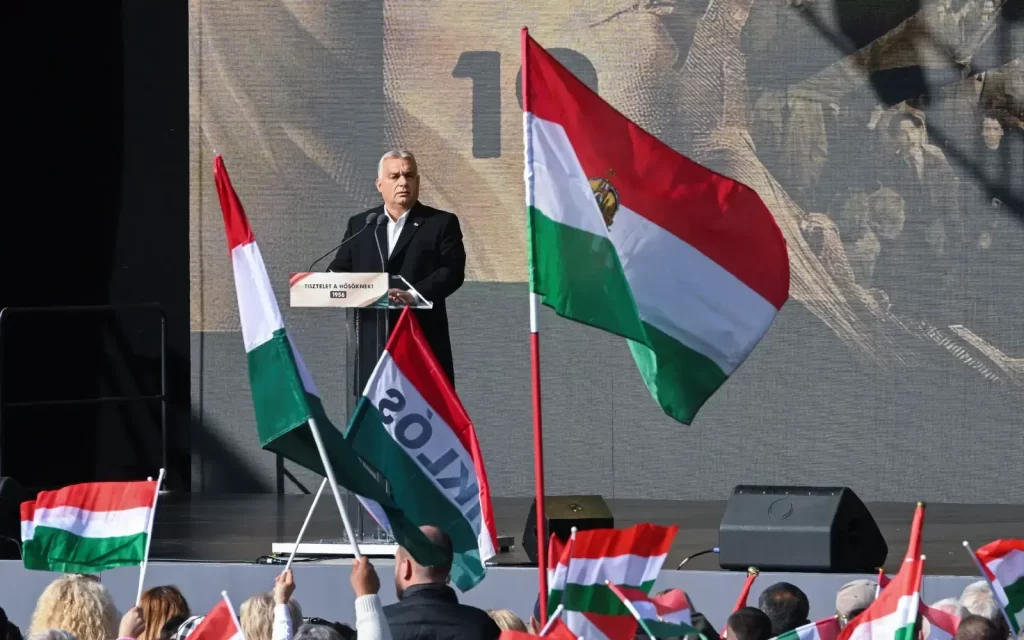Photo: Viktor Orbán speaks at a rally in Budapest -. FMT
Hungary has been in the news for years for the erosion of the rule of law taking place under the rule of Viktor Orbán. As recently as December 2023, for example, Orbán's government had the 'National Sovereignty Law' passed, allowing individuals and organisations receiving funding from abroad to be investigated just like that. This law is seen mainly as a measure to silence critics.
Recently, however, Hungary has been increasingly in the news for their role within the EU. In June this year, for instance, Orbán formed the 'Patriots for Europe' group together with the Czech ANO and the Austrian FPÖ. They are now the third group in the European Parliament.
This is a very problematic development, because if Orbán successfully promotes his anti-rights programme within the EU, it may eventually affect other member states. FMS spoke on this issue with Tineke Strik, MEP for Groenlinks-PvdA and professor of sociology of law and migration law at Radboud University. She has been the chief negotiator for the European Parliament on the rule of law in Hungary since 12 September and travelled to the country on a working visit in October.
The situation in Hungary
During Strik's working visit, conversations with individuals and institutions in the country revealed how bad the rule of law actually is. The population's fear of Orbán's regime was particularly striking. This fear is exactly what Orbán wants, leading to massive self-censorship. Strik explains: "even teachers have now been given the legal status of a civil servant, giving the government access to their computers." In this way, it is very difficult to have a voice other than Orbán's propaganda.
Of course, EU reports have also shown this for a long time, but measures nevertheless do not appear to have been very effective. After pressure from the EU, Hungary, for example, set up a new integrity authority. Strik spoke to the head of this integrity authority, but he told her that he himself was surprised to be hired, as he actually wanted to make changes. As a result, it turned out that in practice the position meant nothing at all.
So Hungary is only taking sham measures to regain access to frozen EU funds. Unfortunately, this policy is also still effective. In December 2023, the European Commission issued a number of EU grants unfrozen because Hungary would have taken enough measures to restore the independence of the judiciary. However, Strik's working visit shows that these measures amount to little in practice.
The EU is a lucrative business
It seems almost a mystery why Orbán would still want to stay in the EU in the first place. Orbán pretty much ignores all the principles of the EU and constantly gets the ire of other countries for his actions such as visiting Russian President Vladimir Putin or repeatedly blocking military aid to Ukraine. So wouldn't it be much nicer for Orbán to just leave the EU altogether? According to Strik, however, he will never do so because he earns a huge amount from the EU.
Hungary is the most corrupt country of the EU and Orbán himself therefore earns well from the EU. Strik explains, "All the EU money he gets just disappears into his own pocket." Orbán uses the EU when it suits him, but does not care about the rules or obligations when it does not suit him. Strik: "Orbán is in no way loyal to the EU and this jeopardises the unity and security of the entire Union."
Support within the EU
With Orbán gaining supporters within the EU, the great danger is that they will adopt a similar attitude towards the rule of law and also put their own interests above those of the EU. According to Strik, we therefore really need to learn lessons from Hungary before it is too late.
Strik: "Once a system like Orbán's is entrenched, it is very difficult to restore it." Other countries have simply left Orbán alone for far too long, which has allowed things to escalate so far in Hungary. Not surprisingly, more and more radical-right parties have learned lessons from Orbán's policies. Strik: "This is really the great danger of impunity."
According to Strik, the responsibility for stopping Orbán and his friends lies with all democratic parties in the EU. These still have a large majority and should in future see the value of democracy much faster and earlier. Strik: "The extreme right simply must not be allowed to come to power." To prevent more countries in the EU from going down the path of corruption and human rights violations like Hungary, democratic parties must isolate the radical right by any means possible.
Netherlands the new Hungary?
It is no secret that Geert Wilders is a close friend and admirer of Orbán. With the PVV joining the government as the largest party, the great danger seems to be that the Netherlands might slowly move in the same direction as Hungary. Orbán, for instance, has taken a lot of power to himself by maintaining a permanent state of emergency since the corona crisis. Therefore, the current government's attempts in the Netherlands to push through migration measures with emergency legislation do not seem like good news.
According to Strik, the deterioration of the rule of law will not be as bad with us: "The Netherlands is not such a young democracy as Hungary and we have strong institutions such as the ombudsman and the Council of State." She does stress that this, of course, does not mean that we have nothing to fear - every democracy has weaknesses.
How next?
Strik is therefore going to try to take action against Hungary in her role as chief negotiator in the coming years. For example, the EU has Article 7 by which countries that do not adhere to EU principles can, among other things, have their voting rights taken away. This has unfortunately not happened yet, but Strik is going to try to motivate enough member states to still activate this article.
On top of this, Strik is going to try to make another visit to Hungary with negotiators from other parties and write a new report on the country. It is time for real consequences for the infringement of freedoms, human rights and democracy within the Union at last. This is important for the future of Hungary and, by extension, the future of the EU.




